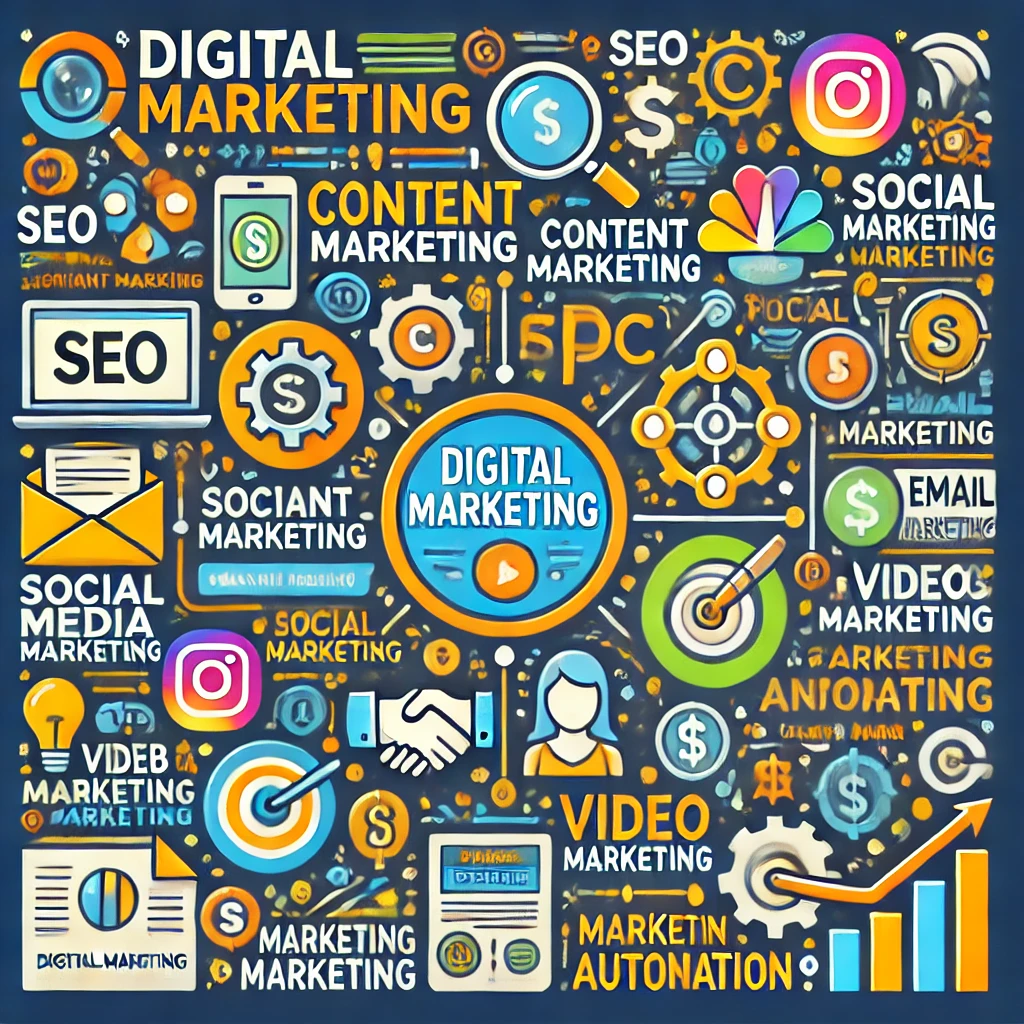
Introduction to Digital Marketing
Digital marketing refers to the practice of promoting products, services, or brands using online channels, platforms, and technologies. It leverages the internet, digital devices, social media, search engines, and email to connect with potential customers. Digital marketing has revolutionized traditional marketing methods by providing faster, data-driven strategies to reach and engage target audiences.
Importance of Digital Marketing
Digital marketing is essential in today’s business landscape due to several key reasons:
- Global Reach: Digital marketing allows businesses to reach a worldwide audience with minimal investment.
- Cost-Effectiveness: Compared to traditional marketing, digital marketing provides better results at a lower cost.
- Targeted Marketing: Platforms like Facebook, Google Ads, and LinkedIn allow businesses to target users based on demographics, interests, and behaviors.
- Measurable Results: Digital marketing tools provide detailed insights into campaign performance, helping businesses refine their strategies.
- Customer Engagement: Digital marketing fosters interaction with customers through social media, email, and chatbots.
Core Components of Digital Marketing
- Search Engine Optimization (SEO):
- Enhances a website’s visibility on search engines like Google and Bing.
- Includes on-page, off-page, and technical SEO strategies to improve rankings.
- Keywords, meta descriptions, and backlinks play a crucial role in SEO success.
- Content Marketing:
- Involves creating valuable, relevant content to attract and retain a target audience.
- Formats include blogs, videos, infographics, podcasts, eBooks, whitepapers, and case studies.
- Creating evergreen content ensures long-term traffic and engagement.
- Social Media Marketing:
- Uses platforms like Facebook, Instagram, LinkedIn, Twitter, TikTok, and Pinterest to promote content and engage audiences.
- Incorporates organic posts, paid ads, and influencer collaborations for broader reach.
- Pay-Per-Click Advertising (PPC):
- Involves paid ads on search engines and social media platforms to drive traffic and conversions.
- Google Ads, Facebook Ads, and LinkedIn Ads are key platforms for PPC campaigns.
- Email Marketing:
- Focuses on nurturing leads and building relationships through personalized email campaigns.
- Newsletters, promotional offers, and automated sequences can drive conversions effectively.
- Affiliate Marketing:
- Businesses collaborate with third-party partners (affiliates) who promote products and earn a commission for each sale.
- Affiliate networks like Amazon Associates and CJ Affiliate connect businesses with potential affiliates.
- Influencer Marketing:
- Collaborating with influencers to promote products or services to their followers.
- Micro-influencers can provide high engagement within niche markets.
- Video Marketing:
- Platforms like YouTube, TikTok, and Instagram Reels allow businesses to showcase products creatively.
- Tutorials, testimonials, and product demos can effectively engage viewers.
- Web Analytics:
- Tools like Google Analytics, Hotjar, and SEMrush provide insights into website traffic, user behavior, and conversion rates.
- Data-driven insights help businesses optimize content, campaigns, and customer experiences.
Benefits of Digital Marketing
- Enhanced Brand Awareness: Digital marketing ensures greater visibility across multiple platforms.
- Higher Conversion Rates: Personalized ads and targeted campaigns improve conversion rates.
- Flexible Strategies: Campaigns can be easily adjusted based on performance data.
- Stronger Customer Relationships: Engaging content and personalized interactions foster loyalty.
- Data-Driven Decisions: Analytics tools provide valuable insights for improved marketing strategies.
- Automation and Efficiency: Automation tools streamline tasks like email marketing, social media posting, and reporting.
Challenges in Digital Marketing
- Intense Competition: Businesses face strong competition for attention online.
- Constant Algorithm Changes: Platforms like Google and Facebook frequently update their algorithms.
- Ad Fatigue: Users may become overwhelmed by excessive advertisements.
- Privacy Regulations: Data protection laws like GDPR restrict certain marketing tactics.
- Technical Expertise Required: Successful digital marketing requires knowledge of multiple platforms and tools.
Advanced Digital Marketing Techniques
- AI-Powered Marketing:
- AI tools improve customer targeting, content creation, and data analysis.
- Predictive analytics help anticipate customer behavior for better decision-making.
- Voice Search Optimization:
- Optimizing content for voice-activated devices like Amazon Alexa and Google Assistant.
- Using conversational keywords helps content appear in voice search results.
- Interactive Content:
- Quizzes, polls, and interactive infographics engage users effectively.
- Interactive videos and augmented reality experiences enhance engagement.
- Augmented Reality (AR) Campaigns:
- AR experiences enhance product demonstrations and customer engagement.
- AR filters on platforms like Instagram allow users to interact with your brand creatively.
- Chatbots for Customer Support:
- AI-driven chatbots provide instant responses and improve customer satisfaction.
- Chatbots streamline sales inquiries, support, and lead generation.
Measuring Digital Marketing Success
Key metrics for assessing performance include:
- Website Traffic: Tracks the number of visitors to your site.
- Bounce Rate: Measures the percentage of visitors who leave without engaging.
- Conversion Rate: Tracks the percentage of users completing a desired action.
- Customer Lifetime Value (CLV): Evaluates the total revenue a customer generates over their lifetime.
- Return on Investment (ROI): Measures profitability and overall campaign success.
- Engagement Metrics: Tracks likes, shares, comments, and time spent on content.
Future Trends in Digital Marketing
- AI and Automation: Automated marketing campaigns powered by AI are improving personalization and efficiency.
- Voice Commerce: As smart speakers become popular, voice-based shopping will grow.
- Sustainability in Marketing: Eco-friendly campaigns will appeal to conscious consumers.
- Virtual Reality (VR): VR experiences will enhance product interactions.
- Hyper-Personalization: Data-driven personalization will improve customer engagement.
- Blockchain in Marketing: Blockchain ensures data security and builds customer trust in transactions.
- Zero-Click Search Optimization: Optimizing content to appear in featured snippets for instant answers.
Conclusion
Digital marketing is an indispensable strategy for businesses seeking growth in today’s competitive market. By understanding various digital channels, implementing effective tactics, and staying informed about trends, businesses can build strong customer relationships, boost sales, and achieve long-term success. Adopting a data-driven approach and leveraging emerging technologies will further enhance digital marketing efforts.
